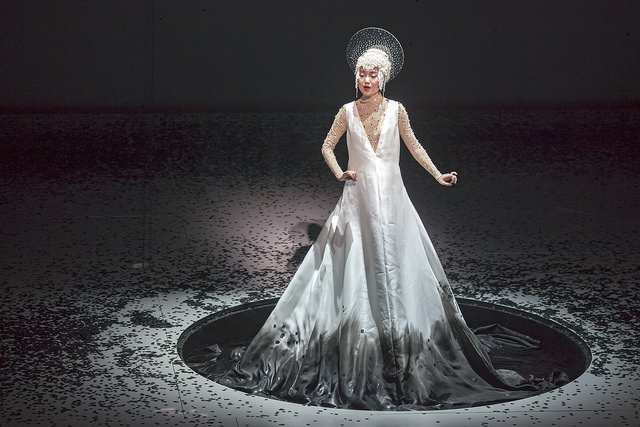One of the many amazing things about Spoleto is the diversity in its music programming, spanning from its acclaimed chamber music series and contemporary opera to noise-jazz and traditional folk music, with everything in between also being represented. While we’ve already written about the charming performance given by Americana duo Emmylou Harris & Rodney Crowell early on in the festival, we’d like to talk briefly about some of the more highbrow (and quite excellent) music we’ve also been enjoying here.
Bank of America Chamber Music
We caught Program IV of this series last Wednesday and could not have been more satisfied with the experience. Programming director and violinist Geoff Nutall is a stylish and witty emcee whose rapport with the audience was worth the ticket price alone. Leading the patrons through the eclectic line-up of compositions with flair and poise, he kept the audience at ease even as the performances themselves set us back.
Alternating between uber-traditional fare (Mozart’s Sonata in G Major, K. 379, Beethoven’s An die ferne Geliebte, op. 98, and Bach’s Brandenburg Concerto no. 2 in F Major, BWV 1047) and more adventurous compositions from Huang Ruo, whose Chinese performance art opera Paradise Interrupted is also featured at the festival, and 20th century Russian composer Alfred Schnittke, the program’s variety and shifts in tone and texture presented a fascinating window into the historical breadth of chamber music as well hinting at all of the possibilities and potential that still exist for the format. Nutall and pianist Pedja Muzijevic opened with the virtuosic flurry of notes required for Mozart sonata, only to be followed up by the unusual instrumentation (violin, cello, voice, djembe, bassoon, pipa) required for Ruo’s “Flow… (I and II),” a folk-indebted piece that showcased the pipa, a traditional Chinese lute that we would later also hear used to great effect in Paradise Interrupted.
Next was the husband-and-wife team of baritone Tyler Duncan and pianist Erika Switzer, who took us through the Beethoven song cycle. The couple gave an assured performance, aided by Nutall’s helpful note that the English translation of the lyrics were printed in the program.
My favorite piece on the program, though, was Schnittke’s austere, enigmatic Hymn II, a piece which saw double bassist Anthony Manzo and cellist Christopher Costanza carefully align the movements of their bows as they produced fragile, ghostly timbres and atonal harmonies that prickled the spine.
The concert closed with an ensemble performance of the popular (and canonical) Brandenberg Concerto, with the slight twist of an E-flat clarinet, played by Todd Palmer, taking place of the traditional piccolo trumpet. The performers gave a lovely rendition of the tune, although audience members are more likely to remember the slapstick improv brought on Nutall and, between movements, oboist Austin Smith, who ostentatiously paused the performance to clean out his instrument.
It’s also worth noting that there was a beautiful moment between movements when a scattering of applause broke out, a bit of a faux paus in classical music performances. Not only did the audience, after some uncertainty, begin clapping along with those that jumped the gun, but they were urged on by Nutall, tradition be damned. It was a giddy feeling, and emphasized the warm balance of world class musicianship and casual relatability that defines the series.
Paradise Interrupted
Later that day we caught the evening performance of Ruo Huo and Jennifer Wen Ma’s opera. It’s a bit of an abstract, high-concept piece that melds Chinese traditions with Western idioms that takes place in a dreamlike landscape. The music was breathtaking, particularly the gorgeous performances delivered by Qian Yi, the show’s star, and countertenor John Holiday, whose voice continues to haunt me, but it was hard not to get lost in the cerebral excellence of the set design. Many might remember Wen Ma name from her work on the 2008 Beijing Olympics, where she directed and designed the opening and closing ceremonies, and her work here has a similar mesmerizing effect. Using a large white performance space and unorthodox lighting, as well as a host of large props and trap doors, a vividly unreal world emerges and disappears over the course of the opera that has to function and opera differently given the limitations of each venue it’s performed at. It’s hard not to note that this kind of immersive, multidisciplinary approach is actually what’s needed in an art form too often grasping tenuously to its past.



